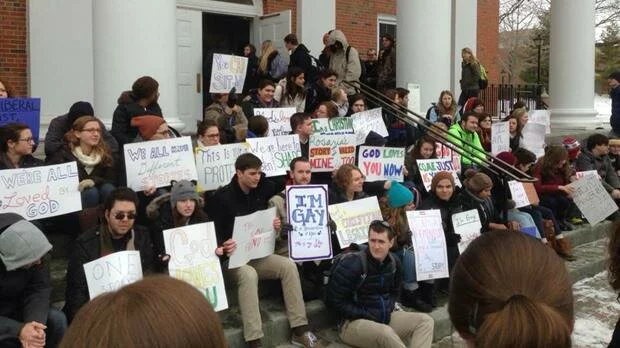In contemporary society, the Church is frequently depicted as being hopelessly divided against itself, and this depiction is not entirely unwarranted. There is ample evidence that the Church is fractured by conflict, with the inflammatory and hurtful comments throughout many websites as but one ripe example.
There is a reason why Christ commanded his disciples to love one another (John 13:34-35). He wanted the way that his followers interacted with each other to draw the attention of the world and to be attractive. While Christian infighting has clearly attracted the attention of the world, it has not attracted non-Christians to investigate the Gospel.
There should be ways in which Christians who disagree on important issues can discuss these issues without resorting to name-calling and without compromising their convictions. A recent episode at Wheaton College suggests that this is possible.
Demonstration at Wheaton

Rosaria Butterfield
Wheaton recently invited Rosaria Butterfield to speak at chapel about her book, Secret Thoughts of an Unlikely Convert: An English Professor’s Journey into Christian Faith. The book tells the story of her conversion to Christianity and her transformation from a feminist professor in a long-term lesbian relationship to a pastor’s wife and full-time mother.
A group of Wheaton students—some who value feminist theory, others who are part of the LGBTQ community—were concerned that the chapel presentation might marginalize some students if Butterfield presented her story as prescriptive. These students arranged a demonstration before the chapel service. Students met before chapel and held signs arguing that their stories are equally valid. They then peacefully attended the chapel service.
Listening and Respect in Theological Dialogue
After chapel ended, Wheaton invited a group of students to dialogue with Butterfield. This meeting represents a way in which Christians can productively discuss divisive issues. Even though the participants did not reach consensus on this issue, there are several positive aspects of this dialogue.
For starters, the conversation was initiated with respect. The students who were concerned about Butterfield’s presentation spoke to Wheaton’s chaplain before the demonstration to make sure that the administration was aware in advance, and to let him know the nature of their concerns. In addition, the demonstration was conducted with respect for Butterfield. It appears that the signs held by students emphasized the validity of their own stories and did not seek to undermine Butterfield’s transformation. According to one student sign, the demonstration was “not a protest.”
Reflective listening is a skill that is sadly lacking.The college responded with respect for its students. It does not appear that Wheaton sought to squelch the students’ voices. Institutions sometimes respond to criticism by resorting to their authority and taking a defensive position. It does not appear that this was the case for this incident. In addition, it appears that Wheaton was willing to participate in the dialogue.
Finally, it appears as though the sides have identified areas where they agree in the conversation, while also clarifying where they disagree. This will allow future conversations at Wheaton to focus on the areas of disagreement.
The dialogue reflects that both the students and the administration were willing to listen to the views of the other side. Reflective listening is a skill that is sadly lacking in internet discussions of significant topics today. Several commentators have criticized Wheaton for allowing the demonstration. Others see the need for pastors and other church leaders to maintain a firm stance on homosexuality. On the other side of the debate, some bloggers see the demonstration at Wheaton as a watershed moment or argue that the Church should not impose Butterfield’s story on all people who experience same-sex attraction.
Discussion without Compromise
Given the shifting public opinion on homosexuality in our culture, I believe that Wheaton was right to listen to its students’ concerns. There is a difference between compromising convictions and listening to the views of others.
It appears that neither side changed their views on the Bible’s teaching on homosexuality. However, they left the conversation with the understanding that the other side was a conversation partner, not an enemy. At the same time, Wheaton was able to realize that they have to make changes in their policy to protect the safety of some of their students.
Christians need to remember that their conversations are being watched by those outside the Church. When we resort to name-calling, we contradict Christ’s command that we should love one another. It is better for us to find ways to discuss these divisive issues with respect. This begins by carefully listening to what others believe. We can listen and show respect without compromising the teaching of Scripture.








Comments
Be the first one to make a comment!